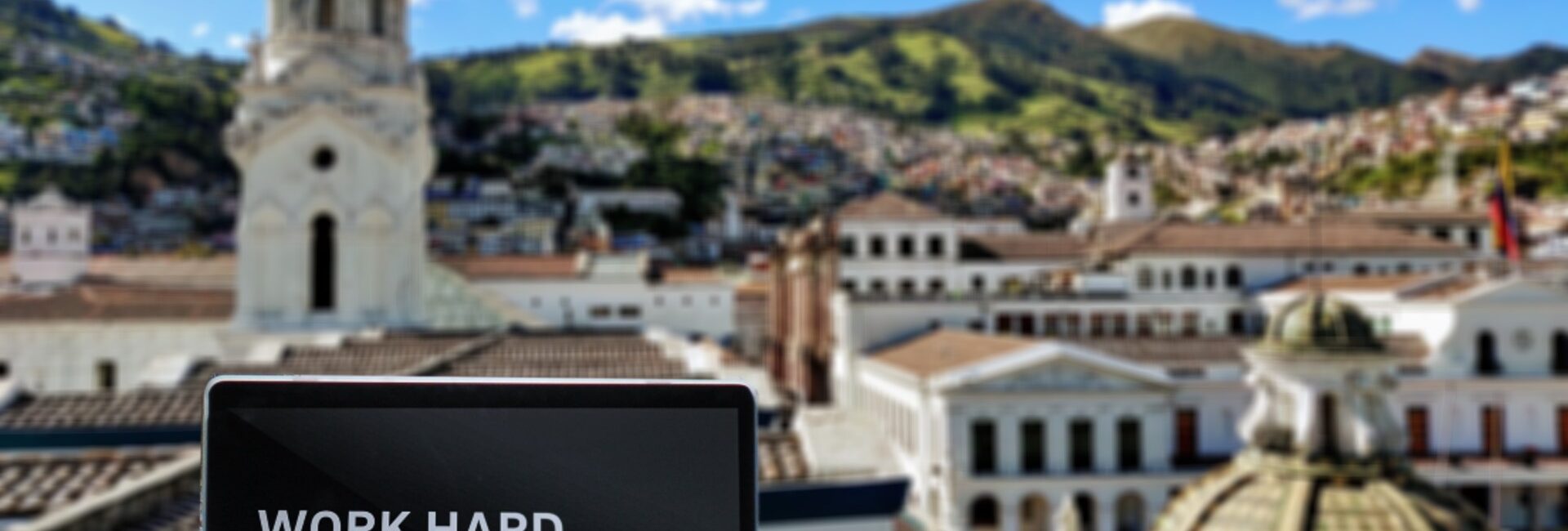
Remote work creates opportunities for global tourism. More and more foreigners are seeking new destinations. The Ecuadorian government is looking for ways to attract them.
It’s not just any day. Abhishek Yadav has woken up with the adventure bug that this time has led him to climb Cotopaxi, but before doing so, he had to make a stop at the skirts of the volcano to have a conference call with a client from Germany. For eight months now, he has been travelling around Ecuador, turning its most exotic landscapes into the offices he once had. So attending that meeting didn’t present him with a tremendous dilemma.
He has been at that pace since December 2020, when after a year (he visited for the first time in 2019) he decided to return to the country, convinced that he could be part of that new wave of digital nomads that in post-pandemic times migrate around the world in search of places where you can be a remote worker and a traveler at the same time. “Ecuador has everything to enchant you, whether it’s the majestic Andes, beautiful beaches, Amazon jungle, lagoons, volcanoes, Galapagos. It is a visitor’s paradise”, says Abhishek enthusiastically, with a Spanish that he admits is “poor”, but that has not been an impediment to living the experience among Ecuadorians and continuing to manage Augurs Technologies and Augurs Healthcare from here, the two companies that he founded and that he now manages with a team that works from India, Germany and Hong Kong.
The increase in remote work, as a result of the global effects of the pandemic, is generating, from a migration, labour, tourism and telecommunications point of view, special attention to what is happening with digital nomads. Paúl Peña, co-founder of Divergent Law, a firm specialising in telecommunications and migration law, says that this trend is already seen in some countries as a strategy to attract more tourists with high purchasing power to help reactivate economies, because “they are people who spend much more on their trips than traditional tourists, as their stay is longer”.Costa Rica’s Congress recently passed a law that will allow foreigners to stay for up to one year in its territory, with a visa that, among several incentives, can be extended for an additional year. Something similar, says Peña, is done in European countries, Panama and Colombia. Ecuador is not far behind. The Ministry of Tourism confirmed that it is analysing, together with the Ministry of Foreign Affairs, the creation of a visa to legalise the temporary stay of this type of workers. “At the moment, the project is in the process of being reviewed by the Legal Secretary of the Presidency and is expected to be approved in the next few days,” said the Ministry of Tourism.


The idea of promoting the country as a destination for remote work is a good one, says Peña, but he makes it clear that this will not be achieved if the policy is not tied to incentives. The main one he advocates is that they should not be considered as tax residents, as that would oblige them, by law, to pay taxes during their short stay, which is not at all attractive. On the list he includes the benefit that they can enter with first-degree relatives, that they can freely bring their work equipment, quickly open bank accounts, use their driving licences and move around without problems.
Peña speaks of the country’s enormous tourism potential, as it is a small territory with well-defined natural areas that can be visited in a short time. The real challenge, he says, lies in technology. Although 94% of the country has internet coverage, there is still work to be done to improve access to a quality service. “Obviously the network exists, but the service is deficient. That makes for a bad experience for the tourist”, Abhishek agrees. He admits that initially it was a hassle to find a good operator. However, in contrast, he cites other good things that make him fall in love. Ecuador, he says, goes beyond the beauty of the Galapagos that global maps show: “It is one of the most diversified countries, both geographically and culturally. He adds that it’s not expensive, it’s easy to get around, it has good food, and the best thing: its people. “I’ve been to many places, including Germany, the United States, Hong Kong, Malaysia, but the welcome I received here, the warmth and the love is incredible. I never feel far from home.
This entrepreneur says that, “as a businessman, I would like to expand my operations in Ecuador, as there are good, qualified and employable people”. Hence, his recommendation is that the incentives that can be defined should also be a catalyst for foreign investment.
Article originally written by Lizbeth Zumba R. and published by Diario Expresso.
Translation by Adriana Navarrete.
